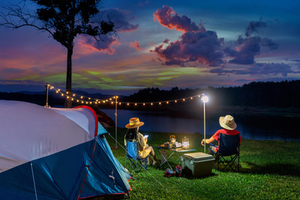
Camping is a beloved outdoor activity that allows you to connect with nature and escape the hustle and bustle of daily life. When it comes to choosing your shelter for a camping trip, two popular options stand out: camping hammocks and traditional tents. Each has its own set of advantages and disadvantages. In this article, we'll explore the pros and cons of camping hammocks vs. tents to help you make an informed decision for your next outdoor adventure.
Camping Hammocks: The Pros
Lightweight and Compact: Camping hammocks are incredibly lightweight and easy to pack, making them an excellent choice for backpackers and hikers. They take up minimal space in your backpack, leaving room for other essential gear.
Elevated Sleeping: Hammocks allow you to sleep off the ground, which can be a significant advantage in wet or buggy conditions. You won't have to worry about uneven terrain, rocks, or roots under your sleeping area.
Quick Setup: Setting up a camping hammock is usually faster and more straightforward than pitching a tent. You'll spend less time on camp chores and more time enjoying the outdoors.
Comfortable Sleep: Many campers find sleeping in a hammock to be more comfortable than on the ground. The gentle sway can lull you to sleep, and you'll wake up feeling refreshed.
Camping Hammocks: The Cons
Limited Space: Camping hammocks provide limited space for gear and movement. If you're camping in colder weather, it can be challenging to insulate yourself properly.
Learning Curve: Achieving the perfect hang angle and getting comfortable in a hammock can take some practice. It's not as intuitive as setting up a tent.
Weather Exposure: While hammocks excel in dry conditions, they can leave you more exposed to the elements during rainy or windy weather. Additional rain flies and insulation are often necessary.
Tents: The Pros
Ample Space: Tents offer more space for gear, changing clothes, and moving around. Larger tents can comfortably accommodate multiple campers.
Weather Protection: Tents provide better protection from rain, wind, and cold temperatures. They offer a secure, enclosed space to shield you from the elements.
Versatility: Tents are suitable for various terrains and weather conditions, making them a versatile choice for campers who explore different environments.
Tents: The Cons
Heavier and Bulkier: Tents tend to be heavier and bulkier than camping hammocks, making them less suitable for backpacking and requiring more effort to transport.
Setup Time: Pitching a tent can be more time-consuming, especially if you're dealing with complicated pole systems and stakes. This setup process can be less convenient after a long day of hiking.
Ground Hazards: Sleeping on the ground can expose you to uneven terrain, rocks, and moisture, leading to a potentially uncomfortable night's sleep.
Ultimately, the choice between a camping hammock and a tent depends on your camping style, preferences, and the specific conditions of your trip. Consider factors like location, weather, the duration of your adventure, and your gear-carrying capacity.
For additional information, expert advice, and high-quality camping gear options, visit the pros at www.outdooradventures.pro. Their platform offers a wealth of resources to help you make the right choice for your camping needs.
In conclusion, camping hammocks and tents both have their pros and cons, and the decision ultimately comes down to your individual preferences and the type of camping experience you seek. Whether you opt for the gentle sway of a hammock or the security of a tent, the most important thing is to get out there and enjoy the beauty of the great outdoors.
Image by Freepik

.png)

-(2).png)


.png)


.png)





-(1140-×-106-px).png)
.jpg)
Leave Comment Below